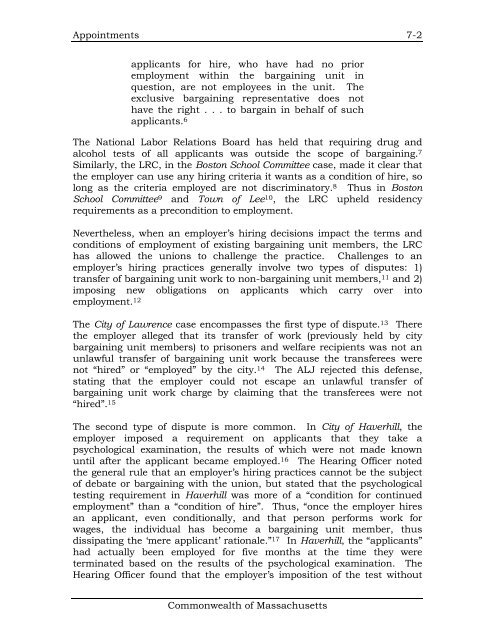Management Rights - AELE's Home Page
Management Rights - AELE's Home Page
Management Rights - AELE's Home Page
Create successful ePaper yourself
Turn your PDF publications into a flip-book with our unique Google optimized e-Paper software.
Appointments 7-2<br />
applicants for hire, who have had no prior<br />
employment within the bargaining unit in<br />
question, are not employees in the unit. The<br />
exclusive bargaining representative does not<br />
have the right . . . to bargain in behalf of such<br />
applicants. 6<br />
The National Labor Relations Board has held that requiring drug and<br />
alcohol tests of all applicants was outside the scope of bargaining. 7<br />
Similarly, the LRC, in the Boston School Committee case, made it clear that<br />
the employer can use any hiring criteria it wants as a condition of hire, so<br />
long as the criteria employed are not discriminatory. 8 Thus in Boston<br />
School Committee 9 and Town of Lee 10 , the LRC upheld residency<br />
requirements as a precondition to employment.<br />
Nevertheless, when an employer’s hiring decisions impact the terms and<br />
conditions of employment of existing bargaining unit members, the LRC<br />
has allowed the unions to challenge the practice. Challenges to an<br />
employer’s hiring practices generaly involve two types of disputes: 1)<br />
transfer of bargaining unit work to non-bargaining unit members, 11 and 2)<br />
imposing new obligations on applicants which carry over into<br />
employment. 12<br />
The City of Lawrence case encompasses the first type of dispute. 13 There<br />
the employer alleged that its transfer of work (previously held by city<br />
bargaining unit members) to prisoners and welfare recipients was not an<br />
unlawful transfer of bargaining unit work because the transferees were<br />
not “hired” or “employed” by the city. 14 The ALJ rejected this defense,<br />
stating that the employer could not escape an unlawful transfer of<br />
bargaining unit work charge by claiming that the transferees were not<br />
“hired”. 15<br />
The second type of dispute is more common. In City of Haverhill, the<br />
employer imposed a requirement on applicants that they take a<br />
psychological examination, the results of which were not made known<br />
until after the applicant became employed. 16 The Hearing Officer noted<br />
the general rule that an employer’s hiring practices cannot be the subject<br />
of debate or bargaining with the union, but stated that the psychological<br />
testing requirement in Haverhill was more of a “condition for continued<br />
employment” than a “condition of hire”. Thus, “once the employer hires<br />
an applicant, even conditionally, and that person performs work for<br />
wages, the individual has become a bargaining unit member, thus<br />
dissipating the ‘mere applicant’ rationale.” 17 In Haverhill, the “applicants”<br />
had actually been employed for five months at the time they were<br />
terminated based on the results of the psychological examination. The<br />
Hearing Oficer found that the employer’s imposition of the test without<br />
Commonwealth of Massachusetts
















